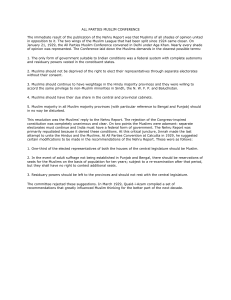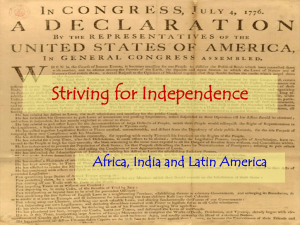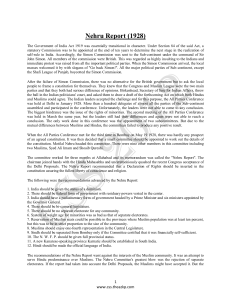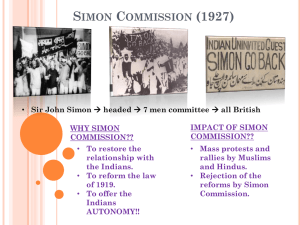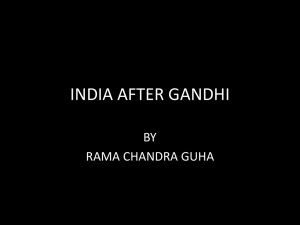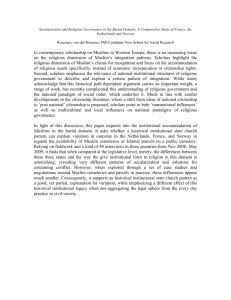BEACONHOUSE SCHOOL SYSTEM
advertisement
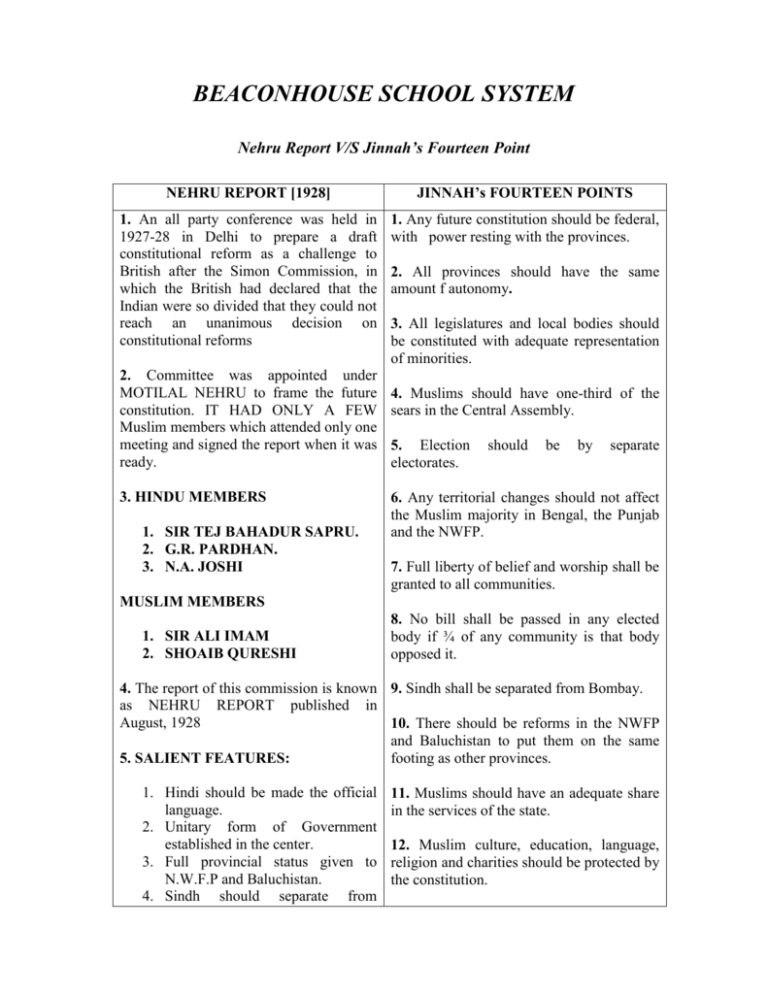
BEACONHOUSE SCHOOL SYSTEM Nehru Report V/S Jinnah’s Fourteen Point NEHRU REPORT [1928] JINNAH’s FOURTEEN POINTS 1. An all party conference was held in 1927-28 in Delhi to prepare a draft constitutional reform as a challenge to British after the Simon Commission, in which the British had declared that the Indian were so divided that they could not reach an unanimous decision on constitutional reforms 1. Any future constitution should be federal, with power resting with the provinces. 2. Committee was appointed under MOTILAL NEHRU to frame the future constitution. IT HAD ONLY A FEW Muslim members which attended only one meeting and signed the report when it was ready. 3. HINDU MEMBERS 1. SIR TEJ BAHADUR SAPRU. 2. G.R. PARDHAN. 3. N.A. JOSHI 2. All provinces should have the same amount f autonomy. 3. All legislatures and local bodies should be constituted with adequate representation of minorities. 4. Muslims should have one-third of the sears in the Central Assembly. 5. Election electorates. should be by separate 6. Any territorial changes should not affect the Muslim majority in Bengal, the Punjab and the NWFP. 7. Full liberty of belief and worship shall be granted to all communities. MUSLIM MEMBERS 1. SIR ALI IMAM 2. SHOAIB QURESHI 8. No bill shall be passed in any elected body if ¾ of any community is that body opposed it. 4. The report of this commission is known 9. Sindh shall be separated from Bombay. as NEHRU REPORT published in August, 1928 10. There should be reforms in the NWFP and Baluchistan to put them on the same 5. SALIENT FEATURES: footing as other provinces. 1. Hindi should be made the official language. 2. Unitary form of Government established in the center. 3. Full provincial status given to N.W.F.P and Baluchistan. 4. Sindh should separate from 11. Muslims should have an adequate share in the services of the state. 12. Muslim culture, education, language, religion and charities should be protected by the constitution. Bombay, if it were capable of bearing its expenditure. 5. The foreign affairs, Army and Defense should be placed under the direct control of the parliament and Viceroy. 6. Separate electorates should be replaced by joint electorates with reservation of seats for the minorities in proportion to their population. [Muslim electorates should be abolished] 7. full responsible government on the model of the constitution of self governing dominions to be introduced in the sub-continent .6. Quaid-e-Azam at an All Party Conference convened in Calcutta in December 1928, proposed 3 amendments in the NEHRU REPORT. 1. 1/3 Muslim representation in the central legislature. 2. Muslim representation in Punjab and Bengal on the basis of population. 3. Residuary powers should be given to the provinces instead of the central Government. 7. The amendment were rejected by Hindus. The Nehru Report was rejected by Muslims. 8. Quaid-e-Azam issues his 14 points in reply to the Nehru Report. 13. All Cabinets [at central or local level] should have at least 1/3 Muslim representation. 14. The federation of India must not change laws without the consent of the provinces. Key to Attempt 1. Point 1,2 and 14 should be supported as federal system 2. Point no 3, 4, 5 and 13 should be supported as Muslims representation in any of legislature. 3. Points no 6 and 8 should be supported as to abide by the Muslims fears. 4. Point no 10 and 11 should be discus as reforms. 5. Point no 7 and 12 religious and cultural rights should be protected.
